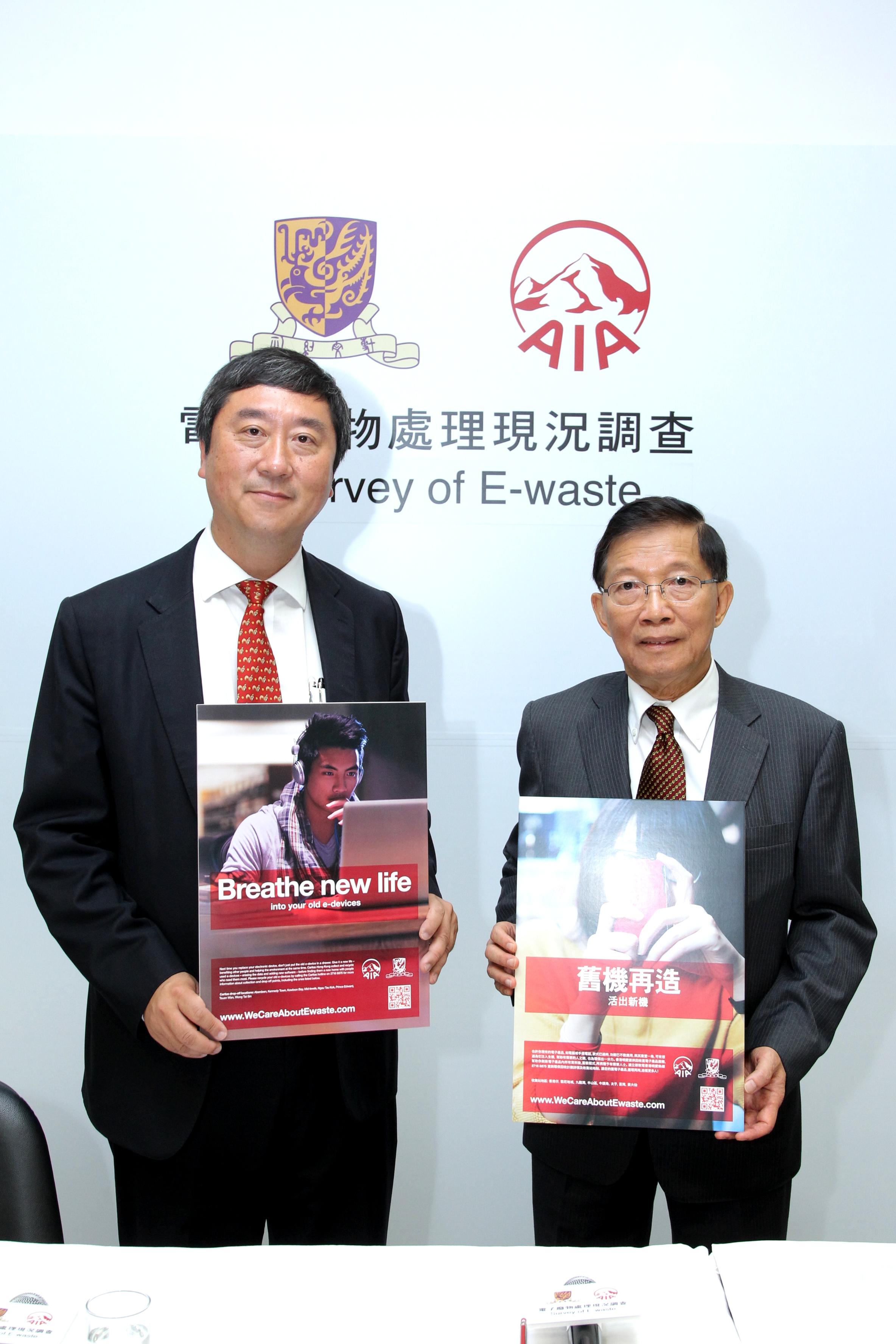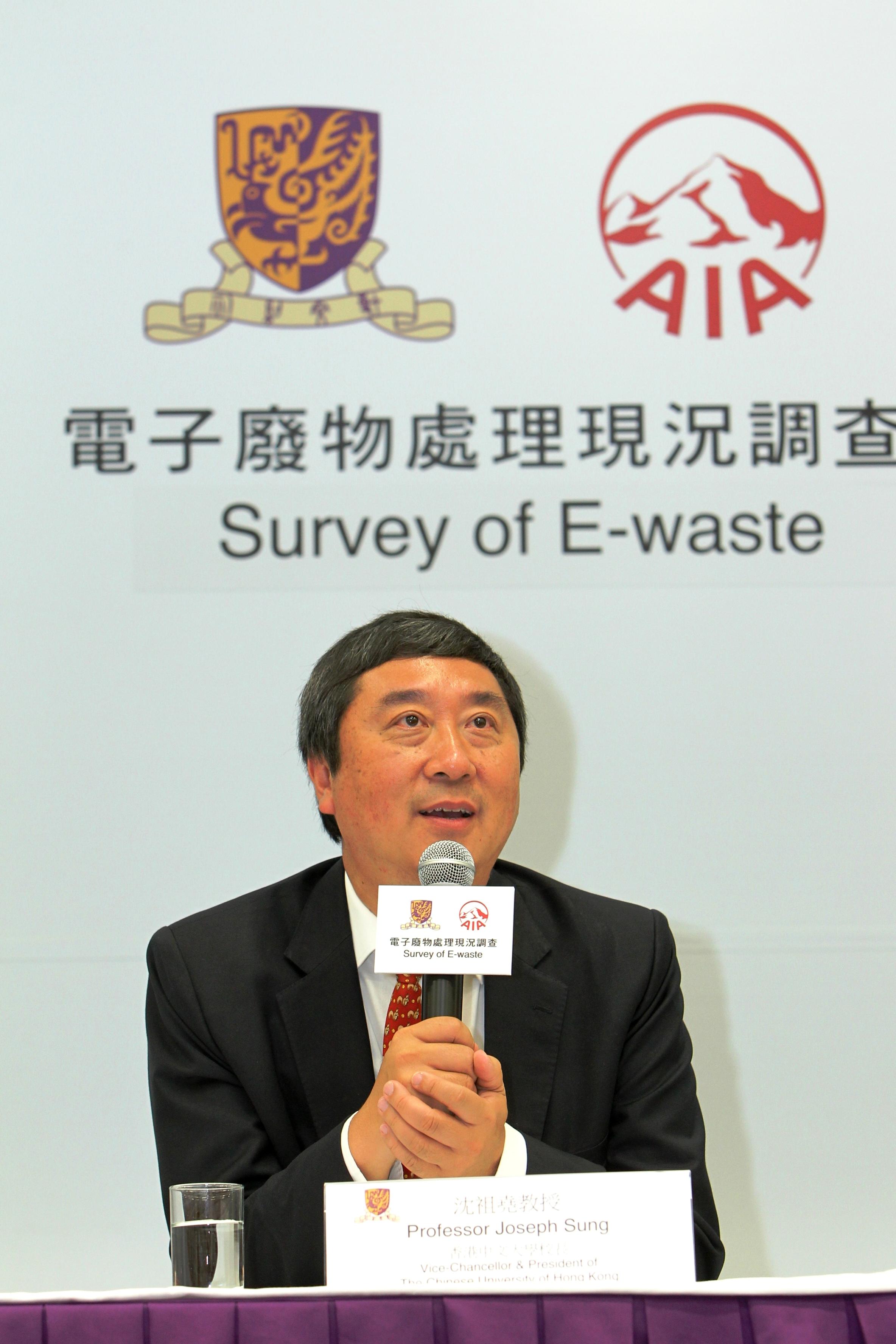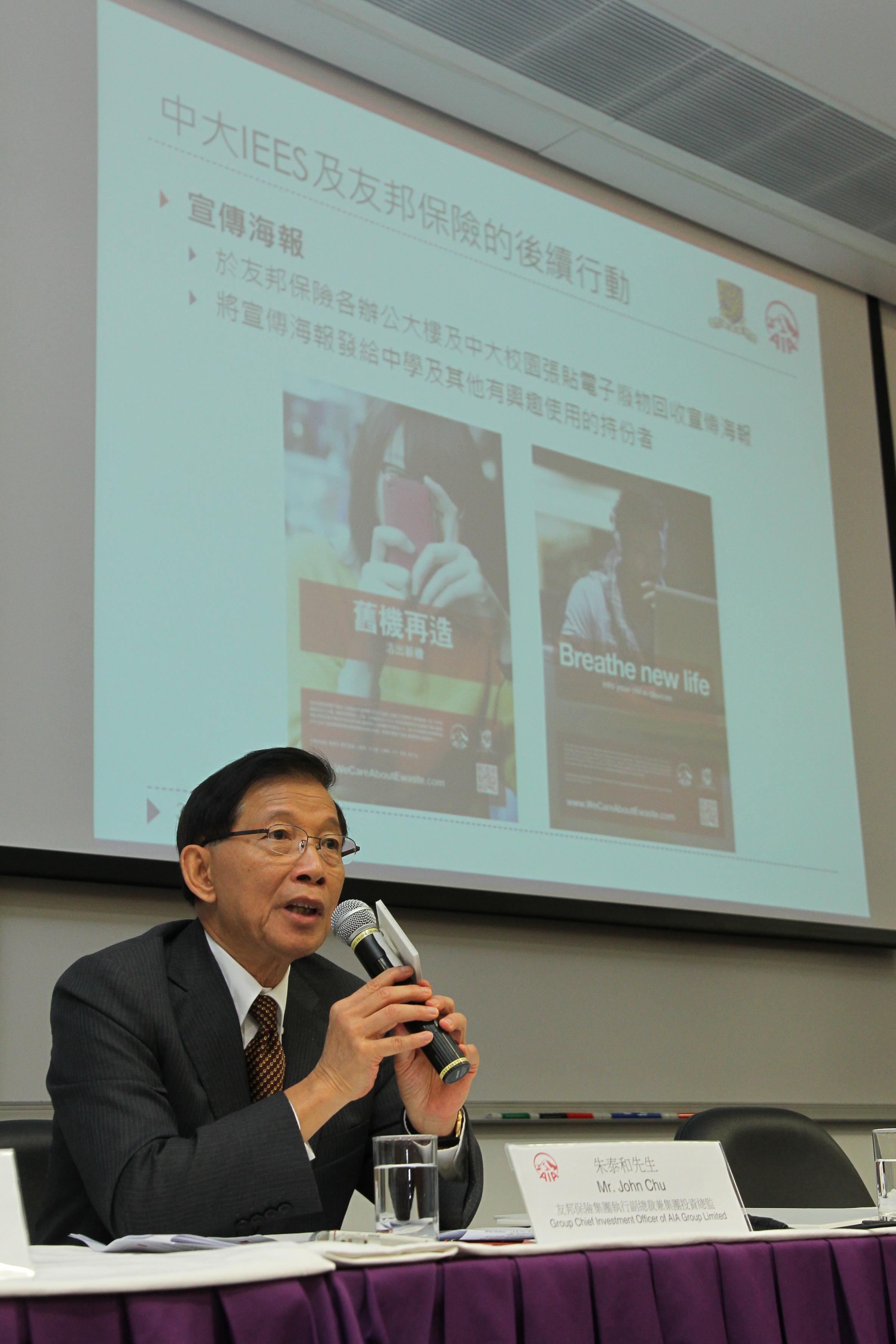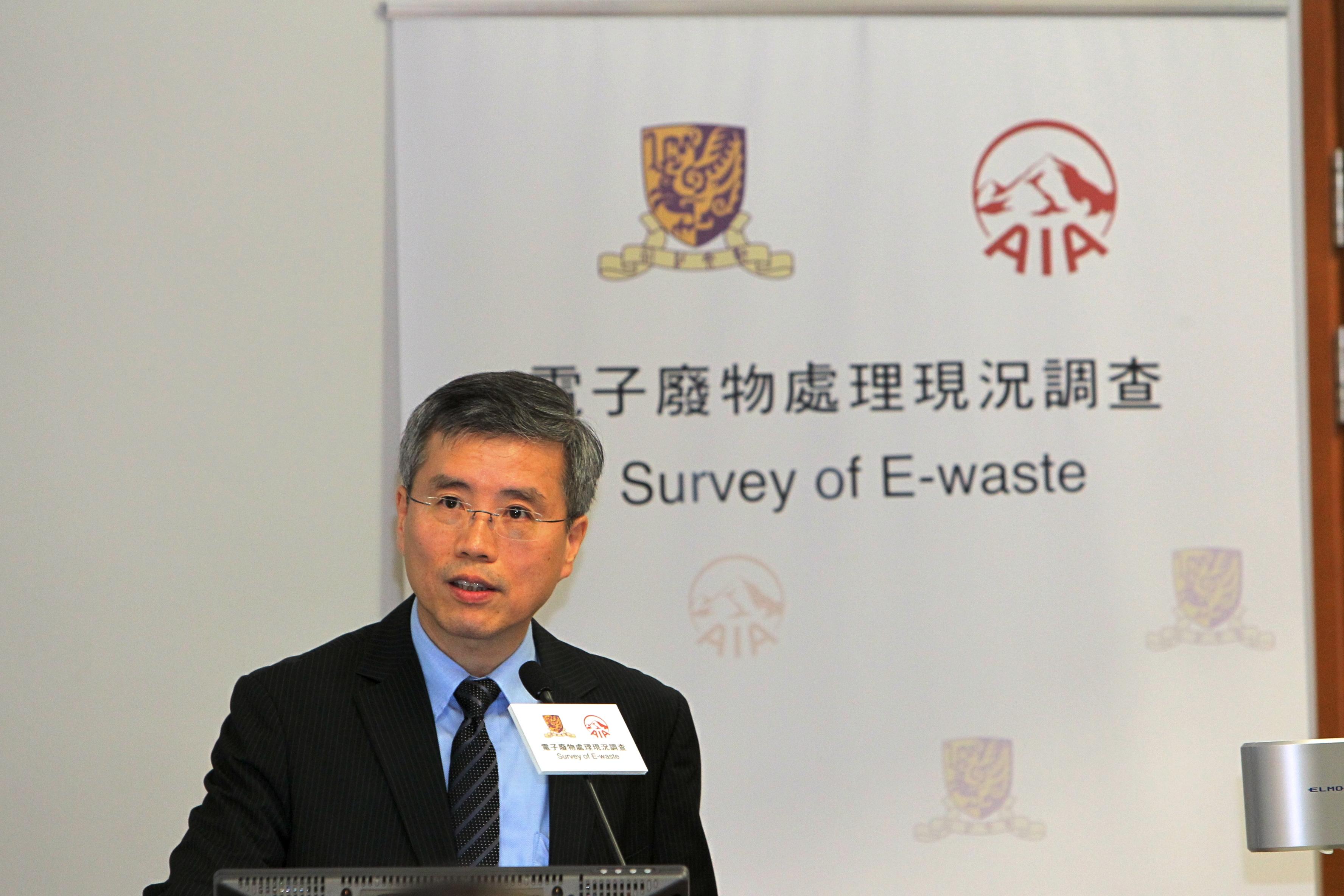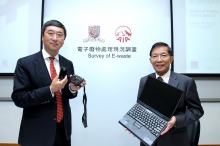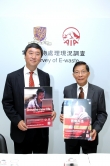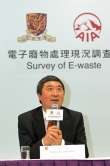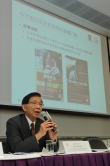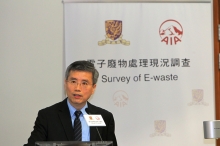CUHK
News Centre
CUHK-AIA E-device Survey Reveals Growing Concern About E-wasteLess Than 3% Hong Kong Residents Recycle Old Electronic DevicesConsumers expect government and manufacturers to do more
Hong Kong adults are very concerned about the growing amount of waste from old phones and other electronic devices (e-devices) but very few are doing anything to reduce this waste, according to a recent E-device Survey organised by the Institute of Environment, Energy and Sustainability (IEES) at The Chinese University of Hong Kong (CUHK) and AIA Group Limited (1299.hk, ‘AIA’). The E-device Survey is part of a larger collaboration between IEES and AIA to raise awareness about electronic waste (e-waste) created by the increasing number of e-devices we own. The Survey was conducted by TNS, a leading consumer research company.
Professor Joseph Sung, Vice-Chancellor & President of CUHK said, “CUHK is committed to sustainable practices and the enhancement of campus environmental quality to nurture a green culture on campus in the long run. It is also intended as an example for both academia and the community at large, and one that can inspire other organizations, educational and otherwise, to implement green practices in the workplace, thereby contributing to the sustainable future of the earth. The University is also dedicated to developing a new generation of leaders who understand the importance of making a positive impact on their local community and its environment, fulfilling the education mission and social responsibility of the University — that is why we are happy to collaborate with AIA who shares our vision of giving back to the local community and being at the forefront of issues that impact many. This e-waste initiative also supports our commitment to making CSR (Corporate Social Responsibility) an integral part of the University’s development. “
John Chu, AIA’s Group Chief Investment Officer and alumnus of CUHK said, “With our long and deep roots in Asia and our commitment to helping people lead healthier lives, we are naturally concerned about environmental issues that can affect people’s health. This Survey confirms that e-waste is becoming a growing challenge for established and emerging markets—young people are buying more and more e-devices, but few are disposing of them properly. We hope this Survey will raise people’s awareness of this issue and encourage manufacturers, the government and consumers to do more — to take appropriate actions to reduce the barriers to recycling e-devices and to encourage proper disposal/recycling behaviour.”
High ownership of e-devices even among teenagers
The Survey, conducted in April-May 2012 among 1,200 men and women aged 18 – 55 from various income and education groups, shows that adults in Hong Kong each owns on average, 3.5 mobile devices such as mobile phones, portable laptops/tablets and digital cameras. Ownership of e-devices is also quite high among those under 18 years old – an average of 3.0 mobile devices.
Such findings are in line with data from the Office of the Telecommunication Authority that Hong Kong has one of the highest mobile subscription penetration rates in the world, at 210.2%.
Growing concerns about impact of e-waste
According to the Survey, adults in Hong Kong discard their mobile phones after using for only 21.3 months on average and get new ones, but only 1% recycle their old phones. Almost half of those surveyed (48%) keep their old phones at home – mainly because of the concern about personal data stored in the device, not knowing what to do with the old devices and lack of recycling drop off centres near home or office.
Despite almost universal ownership of mobile phones, two thirds of Hong Kong adults intend to purchase a new phone in the next 12 months – boosting further the average number of mobile devices owned.
Over three quarters (77%) of adults surveyed acknowledge that e-waste would intensify pollution problems while 74% agree it could cause health problems.
A majority of survey participants think that the government can do more including providing more drop off points for used devices, being more involved and educating the public about what to do. Most of the survey participants also agree that manufacturers should use less harmful materials (66%) and help retailers retrieve old devices (61%).
Willingness to be part of solution
According to the Survey, adults in Hong Kong seem willing to pay a surcharge of, on average, 3.8% of the purchase price to help defray the costs for appropriate disposal of e-devices.
John Chu added, “The willingness of adults in Hong Kong to pay a surcharge to help defray the costs for proper disposal of e-devices is encouraging. Consumers seem willing to be a part of the solution. However, the very low percentage of people actually recycling their e-devices suggests not enough is being done by manufacturers or the government to provide people with the good means to dispose of their old e-devices.”
“We are glad that the findings among 740 of our students are similar to those from the general public and that our students are willing to be part of the solution. We will encourage our students to be involved in this worthwhile issue,” added Professor Dennis Fan, Associate Dean of CUHK Business School.
Future actions
John Chu also said that AIA will be encouraging its employees and their families to recycle their mobile devices by increasing awareness of drop off locations currently available (such as Caritas) and also putting collection boxes in AIA buildings. He encouraged other large employers to follow suit. “It’s a simple way businesses can help make a difference to the growing concern about e-waste in Hong Kong.”
In addition to launching the WeCareAboutEwaste.com website today, AIA and IEES will also develop posters providing useful information about recycling options. In addition to usage within AIA and CUHK premises, these posters will also be shared with other interested stakeholders such as secondary schools.
“To raise the awareness about e-waste among campus members, IEES will organize forums and recycling activities on campus to facilitate discussion and action. We will work with AIA to look for ways to reach other stakeholders to identify further solutions to help alleviate the e-waste challenge,” said Professor Dennis Fan. “Furthermore, under IEES, the Centre for Responsible Business (CRB) will be established to nurture our young generations into conscientious community leaders and to contribute to the sustainable development of our community through research, education and services. The Centre will also develop courses with CSR elements.”
For a more detailed summary of the Survey’s findings, please click this link: www.WeCareAboutEwaste.com
About CUHK
Founded in 1963, The Chinese University of Hong Kong is a forward looking comprehensive research university with a global vision and a mission to combine tradition with modernity, and to bring together China and the West. CUHK teachers and students hail from all corners of the world. We have over 20,000 undergraduate and postgraduate students, of whom 3,000 come from regions outside Hong Kong. CUHK graduates are connected worldwide through an expansive alumni network.
About AIA
AIA Group Limited and its subsidiaries comprise the largest independent publicly listed pan-Asian life insurance group in the world. It has wholly-owned main operating subsidiaries or branches in 14 markets in Asia Pacific – Hong Kong, Thailand, Singapore, Malaysia, China, Korea, the Philippines, Australia, Indonesia, Taiwan, Vietnam, New Zealand, Macau and Brunei – and a 26 per cent joint venture shareholding in India.
The business that is now AIA was first established in Shanghai over 90 years ago. It is a market leader in the Asia Pacific region (ex-Japan) based on life insurance premiums, and holds leading positions across the majority of its markets. It had total assets of US$119,494 million as of 31 May 2012.
AIA meets the savings and protection needs of individuals by offering a comprehensive suite of products and services including retirement planning, life insurance and accident and health insurance. The Group also provides employee benefits, credit life and pension services to corporate clients. Through an extensive network of agents and employees across Asia Pacific, AIA serves the holders of over 24 million individual policies and over 10 million participating members of group schemes.
AIA is listed on the Main Board of The Stock Exchange of Hong Kong Limited under the stock code “1299” with American Depositary Receipts (Level 1) being traded on the OTC market (ticker symbol: “AAGIY”).
AIA is very committed to empowering the people across the region (including its employees and agents) to lead healthier lives. Its Healthy Living Index Survey in 2011 (across the 15 markets where AIA has operations) confirmed the importance and relevance of healthy living but also highlighted adults across the region not doing as much as they should to lead healthier lives.
About TNS
With 15,000 employees, TNS is the world’s largest custom research agency spanning 80 countries, providing consumer insights to many of the world’s leading companies.
In 2010, TNS Hong Kong has conducted over 750,000 interviews covering both consumer and B2B respondents.
Prof. Joseph Sung, Vice-Chancellor & President of CUHK (left), and Mr. John Chu, AIA’s Group Chief Investment Officer attend the press conference on a survey of e-waste.



